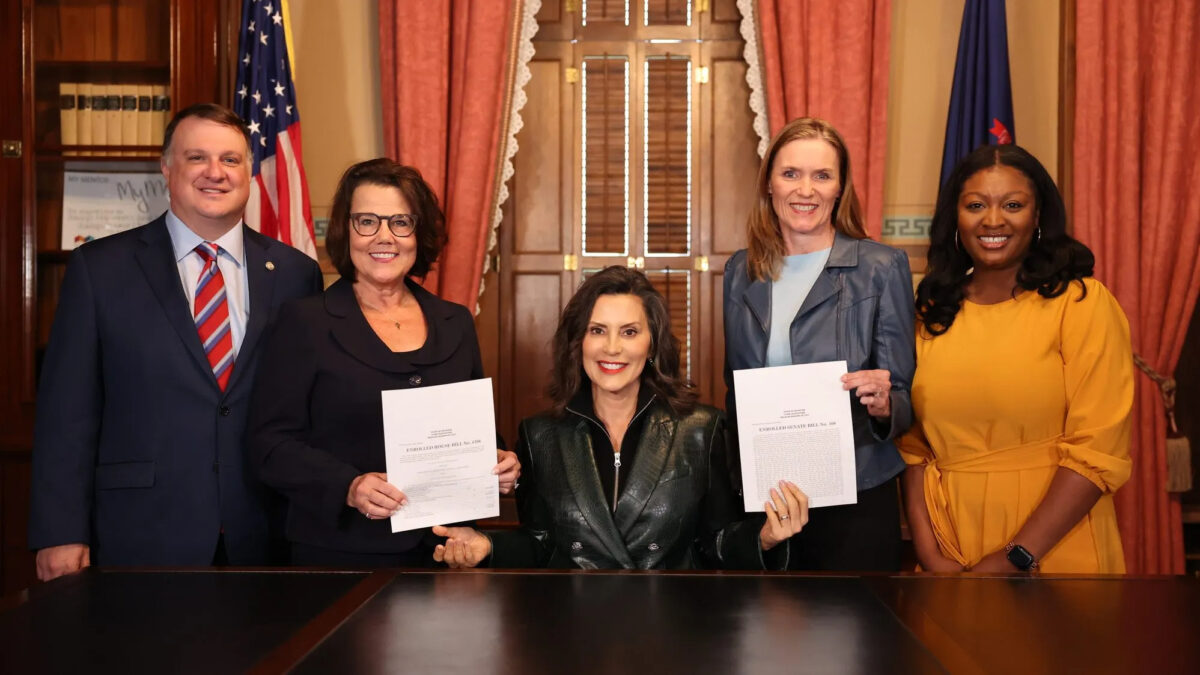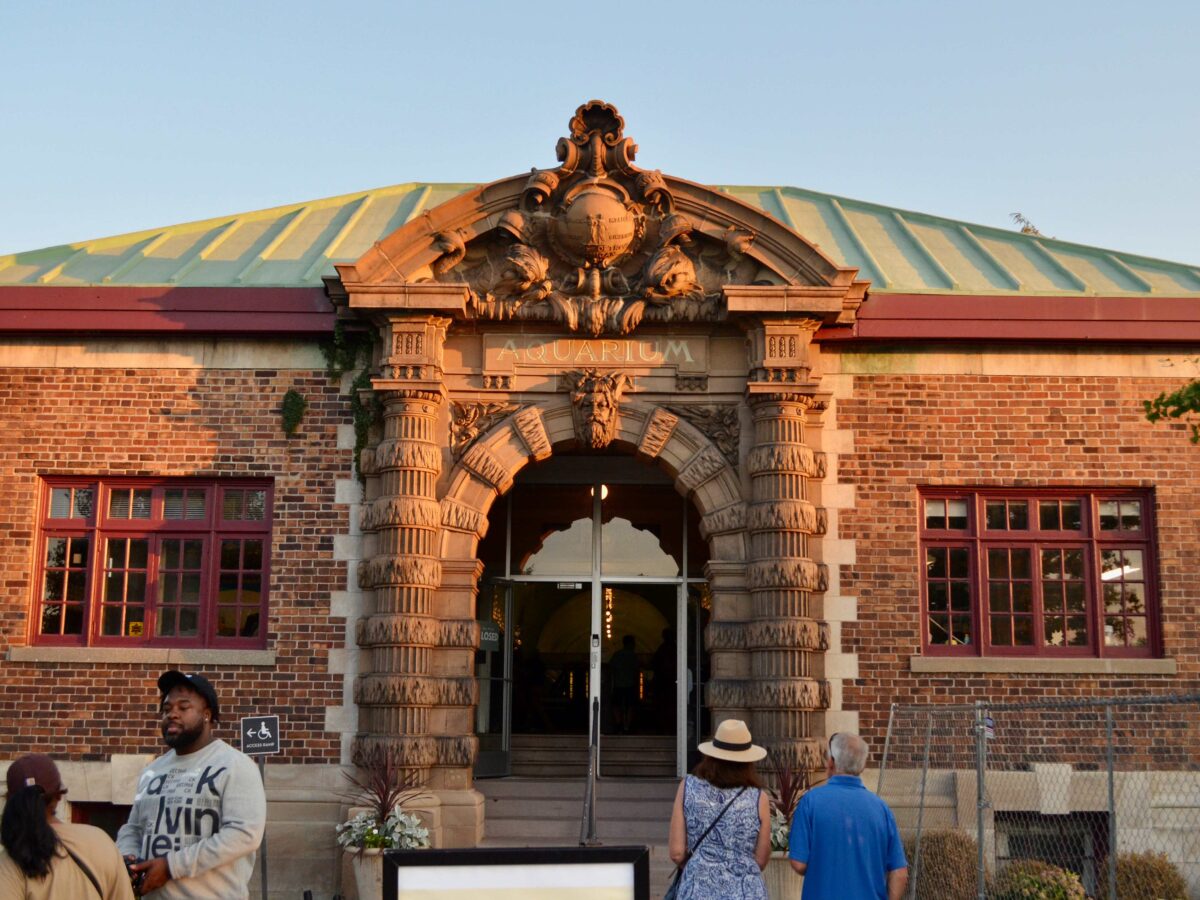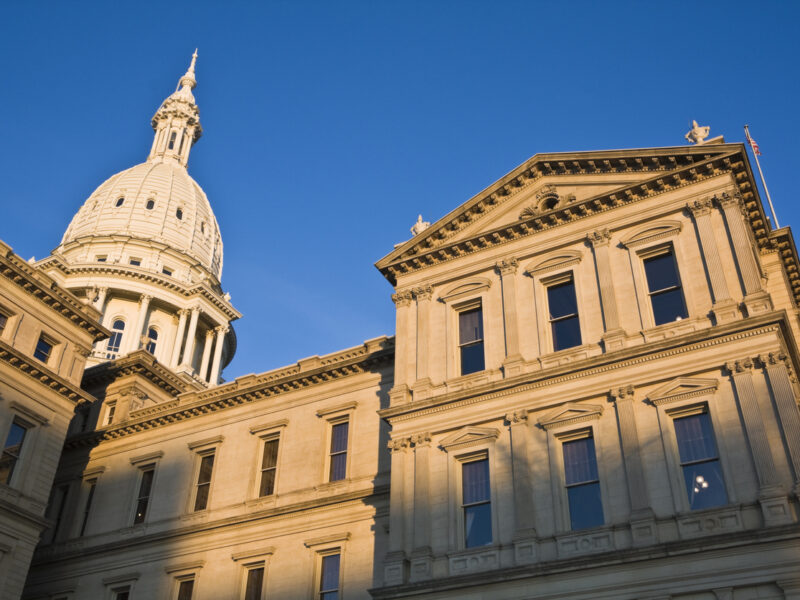Overview:
- Michigan Gov. Gretchen Whitmer signs $81 billion state budget with new money for roads, free school meals and more.
- Whitmer and legislative leaders failed to finalize a budget by Oct. 1 deadline but passed a stopgap bill to avoid government shutdown.
- Spending plan ends funding for key business incentive program but Whitmer says she and legislative leaders will revisit by year’s end.
by SIMON D. SCHUSTER and JORDYN HERMANI
Bridge Michigan
This story was originally published by Bridge Michigan, a nonprofit and nonpartisan news organization. To get regular coverage from Bridge Michigan, sign up for a free Bridge Michigan newsletter here.
LANSING — Gov. Gretchen Whitmer on Tuesday ended months of uncertainty by signing an $81 billion state government budget — finalizing a bipartisan compromise with long-term road funding, a new marijuana tax and what she called a pledge to revisit economic development programs in the future.
“I’m so grateful to legislators on both sides of the aisle for coming together to get this done,” Whitmer said in a statement released after she signed the bills in a private ceremony at the Michigan Capitol.
The spending plan totals $81 billion when counting about $5 billion in Medicaid provider tax revenue moved into contingency funds. That’s less than the $82.5 billion budget Whitmer signed last year and the $84.5 billion proposed by Senate Democrats, but more than the $78.5 billion proposed by House Republicans.
Discretionary spending from the state’s general fund will total $14.1 billion, a roughly $760 million cut from the nearly $14.9 billion allocated in the budget Whitmer signed last year.
A spokesperson for the governor told Bridge Michigan that Whitmer didn’t veto any spending from the plan, a constitutional power Whitmer had wielded liberally in the past, even when the Legislature was solely under Democratic control.
RELATED:
- Michigan gets a new state budget: Winners, losers in the $81B deal
- Legislators kill Gretchen Whitmer’s $2B cash-for-jobs program
- Lawmakers reject money for Whitmer’s population growth office
While House Republicans had pushed for steeper spending cuts, Speaker Matt Hall said the new budget gives taxpayers “better value for their dollars” and eliminates what the Richland Township Republican called “waste, fraud and abuse.”
Whitmer’s signature on the spending plan capped a fraught, months-long process.
Leaders in Michigan’s newly divided Legislature traded barbs for months, and the GOP-controlled House did not pass its own spending plan until August — more than a month after a July 1 deadline written into state law. An earlier Senate spending plan, meanwhile, overshot state revenue estimates revised downward due to funding cuts from President Donald Trump’s tax-and-spend law.
Whitmer and legislative leaders announced a budget framework on Sept. 25 but were unable to finalize details before the new fiscal year began Oct. 1. Instead, they quickly passed a continuation spending bill to keep the state government open while hammering out the details. That funding was due to run out Wednesday.
The budget cycle “featured unprecedented challenges,” Senate Majority Leader Winnie Brinks, D-Grand Rapids, said in a statement. But officials were still able to “show the rest of the country what leadership can look like in divisive political times,” she said.
The budget includes two components: You can review the full general state government spending plan here, and the full education spending plan here.
Here’s what you need to know about the new state budget:
Cuts biz incentives, but Whitmer teases deal
The budget slams the door shut on a record-setting business subsidy plan that Whitmer had championed: It does not include the additional $500 million Whitmer had sought for the Strategic Operating and Attraction Reserve (SOAR) Fund.
Created with bipartisan support in late 2021, SOAR became controversial as the Whitmer administration spent more than $2 billion on large-scale subsidies and land development to try and lure job creators to the state. Some deals fell apart, and promised jobs were slow to materialize.
While lawmakers have said that SOAR is dead, Whitmer’s office said Tuesday that she and legislative leaders agreed to pass some sort of new economic development legislation by year’s end.
“We are proud of the shared commitment to passing bipartisan legislation before the end of this year that will make it easier to create and retain more good-paying, high-skill jobs in Michigan so we can continue to lead the future of advanced manufacturing,” Whitmer spokesperson Stacey LaRouche said in a statement.
She did not provide any additional information.
Boosts road funding — especially local roads
The budget and related policy bills Whitmer signed Tuesday are projected to eventually generate more than $1.8 billion a year for roads, including about $1 billion this fiscal year as the new laws take effect.
That’s less than the $3 billion both Whitmer and House Republicans had initially sought — an amount advocates have argued is truly needed to address long-term needs.
Most of the new funding will go to local roads. Here’s the breakdown in new road spending for fiscal year 2026, according to the House Fiscal Agency.
- State trunkline: $179.7 million
- Cities/villages: $246.1 million
- Counties: $456.7 million
- Rail grade separation fund: $40 million
- Local bus operations: $42.4 million
- Infrastructure protection authority: $65 million
- Airport improvement program: $6.8 million
- Detroit airport: $6 million
Includes tax hikes — and tax breaks
Some of the new road funding will come from a new 24% wholesale marijuana tax, which is set to begin in January and projected to generate $420 million a year. Marijuana industry advocates have decried the plan, arguing it will lead to higher prices for consumers, force companies out of business and benefit the illegal black market.
Additional road funding — $688 million this year, $1 billion by fiscal year 2030 — will come from corporate income taxes. A related bill will delay some state tax breaks that businesses were expecting because of President Donald Trump’s “big, beautiful” law, saving the state about $540 million in the fiscal year that began last week. Business groups opposed the measure, arguing it amounts to a tax hike on job creators.
But the larger budget deal also includes new House GOP-backed tax exemptions on income from tips, overtime pay and Social Security. Those tax cuts, which mirror new federal exemptions pushed by Trump, would last three years and are expected to cost the state at least $188 million annually.
Continues free school meals
Michigan will continue to make school meals free for all students, a top priority of Whitmer and Senate Democrats. The budget includes $201.6 million to cover meals for students who don’t qualify for no-cost programs through the federal government.
The budget also includes a record $10,050 in per-pupil funding for Michigan schools, up from $9,608 this year, and also provides full funding for cyber charter schools. Those changes will cost the state $593.5 million. It also adds $321 million for mental health and safety grants that are available to both public and private schools.
Cuts autism support, Going Pro, Pure Michigan, vacant jobs
The budget includes several cuts, including a $22 million reduction for the state’s Going Pro Talent Fund, which helps employers train and develop employees, and a $9 million cut to the Pure Michigan tourism advertising campaign.
Lawmakers also rejected Whitmer’s request for $10 million to implement recommendations from the population growth council she created in 2023. Between 1990 and 2020, no state except West Virginia grew slower than Michigan, which has about 10.1 million residents.
The budget cuts funding for more than 1,700 full-time equivalent state government employees, a top priority of House Republicans. Most of that comes from cutting vacant positions, including funding for 870 jobs in the Department of Health and Human Services, 373 jobs in the Department of Corrections and 243 state police post operation positions, according to a nonpartisan analysis.
Among the more controversial cuts: $2 million in funding for Autism Navigator, a program run by the Autism Alliance of Michigan that connects families with various resources.
That cut was added to the budget during “11th hour” leadership negotiations and “wasn’t even known by most legislators until after we voted,” state Rep. Kelly Breen, D-Novi, wrote on social media, promising to try and restore the funding in the future.
“We are despondent,” she wrote. “Many of us have close family members affected, and the navigators are essential. From getting kids the help they need in school, to finding the right medical professionals, to understanding career and vocational options — these navigators make all the difference.”
MORE MICHIGAN BUDGET NEWS
Michigan budget bills dial back GOP environmental cuts as shutdown deadline approaches
Gov. Gretchen Whitmer to decide on budget legislation that would cut funding for Michigan’s environmental regulator by 7%, down from a proposed 19% cut, and protects health care and transit funding.
Belle Isle could shut down without Lansing budget deal: ‘That would be terrible’
Michigan must pass a budget by Oct. 1 to avoid a government shutdown and resulting closures or access limitations at state parks like Belle Isle.
House GOP budget slashes Michigan’s water, health care spending: Whitmer calls for ‘serious and fast negotiations’
The likelihood of a state government shutdown is high, State Sen. Jeff Irwin tells Planet Detroit.
Includes earmarks, but with new rules
They had to agree to House-backed reforms, including sponsorship disclosure before the vote, but Michigan lawmakers still got at least $160 million in earmarks added to the budget through “community enhancement grants” and “legislatively directed spending items.”
The earmarks allow lawmakers to secure funding for no-bid projects in their districts, often in exchange for their votes on the full budget. They’ve proven controversial in recent years, leading to criminal charges in one case and at least two other ongoing investigations.
Earmarks included in the new budget will use taxpayer dollars to purchase police Tasers, a harvest simulator, art museum upgrades and more.
The budget also includes $270 million to expand Rx Kids, a cash aid initiative for moms and babies. That money could be considered an earmark – Senate Majority Leader Winnie Brinks, D-Grand Rapids, had requested a $100 million earmark for the program — but the money will come out of funds restricted for health and family assistance.
Boosts colleges — even ‘woke’ ones
Not included in the budget: Major funding cuts for the University of Michigan or Michigan State University, which conservative lawmakers had targeted for what they called “woke” policies.
Instead, all 15 of the state’s public universities will see funding increases of between 1.9% and 4.7%. U-M will see a $7.8 million funding increase instead of the $237 million cut proposed by House Republicans. MSU will get an extra $6.9 million instead of a $59.8 million cut.
In: Selfridge, ice storm recovery. Out: Copperwood mine
The budget includes $26 million for expansion plans at Selfridge Air National Guard Base, along with $14 million for ice storm recovery money for northern Michigan.
But it does not include funding for a proposed copper mine near the western Upper Peninsula. Local lawmakers had sought $50 million for Wakefield Township to make infrastructure improvements supporting Highland Copper Co.’s efforts to open a $450 million mine.
The funding was backed by local officials and economic developers, but some legislators and environmental advocates argue the project could threaten the nearby Porcupine Mountains Wilderness State Park and Lake Superior.
This article first appeared on Bridge Michigan and is republished here under a Creative Commons Attribution-NoDerivatives 4.0 International License.





